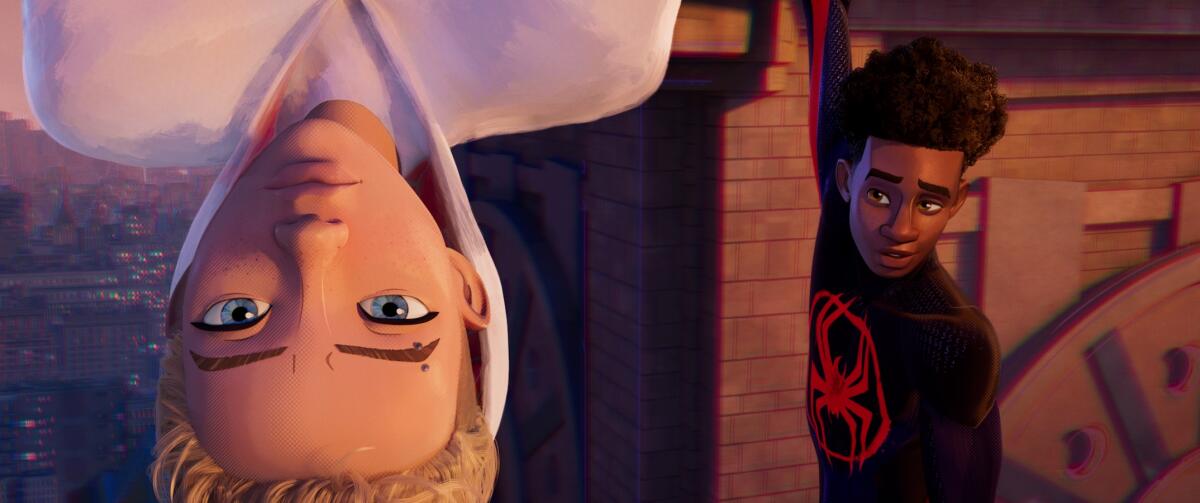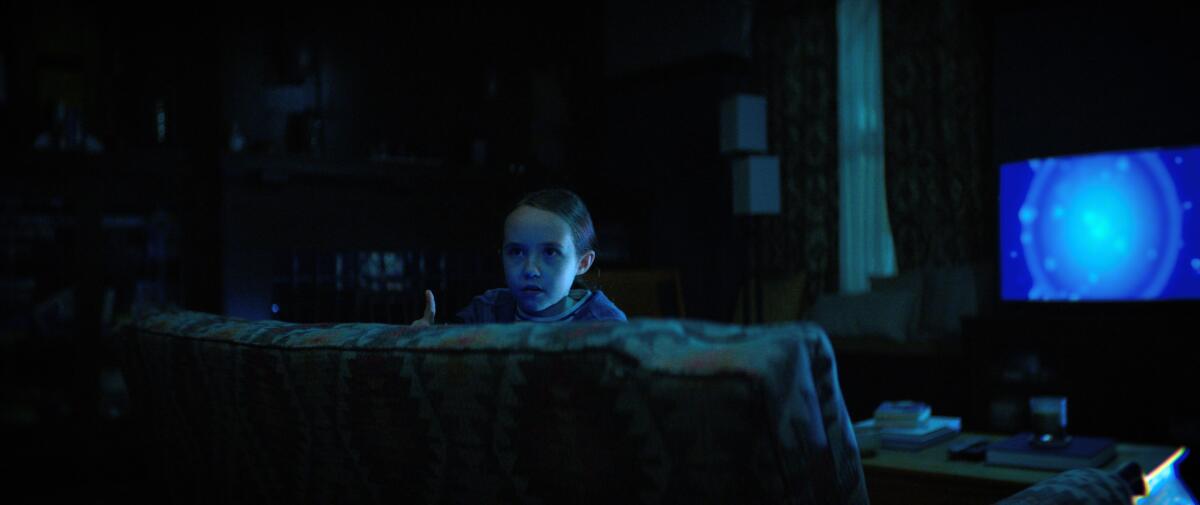‘Spider-Man: Across the Spider-Verse’ is just as good as its predecessor

Hey! It’s Sonaiya Kelley, covering for Mark Olsen. Welcome to the latest edition of your regular field guide to a world of Only Good Movies.
Puppets and Pride. In celebration of Pride Month, the Academy Museum of Motion Pictures will offer a series of drop-in workshops featuring the Bob Baker Marionette Theater with a focus on “stories of love, belonging and finding your place in the world.” For the next three Saturdays, the museum will host “Pinocchio”-inspired workshops followed by an hourlong marionette show featuring queer history and medleys from LGBTQ+ icons.
Hitchcock and Chill. This weekend, Secret Movie Club will host a double feature of “Dial M for Murder” and “To Catch a Thief” as part of its Alfred Hitchcock: The Master series. 35-millimeter prints of the films will be shown at the SMC Theater in downtown L.A. beginning at 7:30 p.m.
Super 8 101. Long Beach Community Media Arts and Place LB will host a Super 8 workshop Saturday afternoon, in which patrons will shoot and potentially hand-process their own film while brushing up on “film history, camera mechanics and analog cinematography techniques.” But act fast: The free workshop, with all equipment and materials provided, is capped at just six participants.
Enjoying this newsletter? Consider subscribing to the Los Angeles Times
Your support helps us deliver the news that matters most. Become a subscriber.
‘Spider-Man: Across the Spider-Verse’
“Spider-Man: Across the Spider-Verse” is the latest multiverse-traversing superhero movie and one of the most acclaimed, with a 95% “fresh” score on review aggregation site Rotten Tomatoes. A follow-up to the Oscar-winning “Spider-Man: Into the Spider-Verse,” the film reenters the world of Miles Morales (Shameik Moore), who is pulled back into a world of alternate universe Spideys and villains. Directed by Joaquim Dos Santos, Kemp Powers and Justin K. Thompson from a script written by Phil Lord, Christopher Miller and Dave Callaham, the film is now playing.
For Tribune News Service, Katie Walsh wrote, “Drawing from inspirations beyond the comic book world as diverse as Abstract Expressionism, storybook illustrations, ballet and punk, ‘Across the Spider-Verse’ is a stunning blend of artistic traditions with a gleefully disruptive attitude. It’s essentially a cyberpunk text, ‘The Matrix’ of animated comic book movies, in which Miles has to decide if he will determine his fate or adhere to the stories that have already been written for him.”
For Vox, Alex Abad-Santos wrote, “Even with my anti-multiverse bias, I found my imagination awakened while watching ‘Across the Spider-Verse.’ The key to this splendid film is its commitment. The movie isn’t content with being another Spider-Man movie, another movie about the multiverse, or another superhero movie. It challenges ideas about great power and responsibility, stories about the worlds we live in and the things we’re searching for, and our concepts of heroism and morality. And it does so with a gorgeous, imaginative animated style that makes each world seem limitless.”
For AP, Jake Coyle wrote, “‘Spider-Man: Across the Spider-Verse’ is the rare sequel that dazzles as much as the original did. It’s something to behold. If ‘Into the Spider-Verse’ reveled in the head-spinning collision of universes, ‘Across the Spider-Verse’ turns the multiverse blender up a notch, or 10...It’s the first Marvel movie that I felt in the theater a palpable disappointment that it was over.”
For Entertainment Weekly, Christian Holub wrote, “‘Spider-Man: Across the Spider-Verse’ totally exceeds expectations when it comes to visual aesthetic and character development. Where the first movie was a coming-of-age story about how fun it is to become Spider-Man, this movie is about how hard it is to actually be Spider-Man — day in and day out, making all kinds of sacrifices to live up to the awesome responsibility of the mantle.”

‘Past Lives’
The feature debut from playwright Celine Song, the loosely autobiographical “Past Lives” centers around a romantic triangle between a Korean immigrant (Greta Lee), her childhood sweetheart (Teo Yoo) and American husband (John Magaro). The film, a critical darling at both the Sundance and Berlin film festivals, is in theaters now.
For The Times, Justin Chang wrote, “‘Past Lives,’ folding two decades into less than two hours, is as swift and fleet as it is emotionally and philosophically expansive ... This is at once the loftiest and the most grounded love story I’ve seen in some time, a movie that feels lingering and contemplative in the moment but is over as quickly (too quickly) as a drink with a long-absent friend. You leave this movie grateful to have lived alongside these characters to this point, and wondering about the infinite possibilities that lie ahead.”
For Tribune News Service, Katie Walsh wrote, “The treatment of time, which is stretched and pulled, crumpled, torn and put back together, makes ‘Past Lives’ a deeply meditative and existentially curious piece, but the thoughtful 35mm cinematography by Shabier Kirchner brings a rare and truly beautiful quality of warmth and grain to the film, evoking a sense of moody sumptuousness, the celluloid drinking up light and texture. Kirchner’s camera tells us what we need to know about these characters in relationship to each other, linking them in space, drifting from face to face in conversations, or boxing out a third wheel.”
For Vanity Fair, Richard Lawson wrote, “Song’s film is about the resignation, the acceptance of lost things, that becomes a defining part of adulthood. ‘Past Lives’ is also, subtly and poignantly, about the immigrant experience, what it is to leave one life behind—likely forever—in exchange for another. ‘Past Lives’ is not concerned with regret. It is instead a thoughtful, humane rumination on what may be fixed in personal history but remains forever fluid in the mind.”
For the Hollywood Reporter, David Rooney wrote, “It’s difficult to convey the multilayered beauty of ‘Past Lives’ beyond just urging people to see it and lose themselves in its transfixing spell. So if you want that experience in its purest form, stop reading here and just trust me that the A24 release is an exceptional movie, destined to have a life long after its rapturously received Sundance premiere and upcoming Berlin competition slot.”

‘The Boogeyman’
Based on the Stephen King short story of the same name, “The Boogeyman” is an imperfect adaptation from director Rob Savage. The film follows a father (Chris Messina) and his two daughters (Vivien Lyra Blair and Sophie Thatcher) who are still reeling from the death of their mother the month before. The film, adapted by “A Quiet Place” scribes Scott Beck and Bryan Woods, is now playing.
For The Times, Robert Abele wrote, “When ‘The Boogeyman’ is in haunted-house mode, Savage and cinematographer Eli Born work the framing, the light sources and the shadows with admirable care and patience, even if the loudly scored jump shocks are perhaps one too many. But as soon as it segues to monster movie, a woeful metaphoric derivativeness takes over as swiftly as icky black tendrils spread across the Harpers’ walls and ceiling.”
For Vulture, Bilge Ebiri wrote, “Taken together — the darkness, the quiet, the inchoate beast of indeterminate origin — it all makes an effective visual metaphor for grief: No matter what we do, the darkness refuses to go away, and the monsters within it remain unknown and unknowable. That’s a powerful idea, and the rigor with which Savage sticks to his stylistic guns helps the film resonate, at least a little. It’s as if the movie itself can’t shake free of its sadness.”
For the Washington Post, Michael O’Sullivan wrote, “‘The Boogeyman’ is rather effective at what it sets out to do, probably due in large part to the contributions of Beck and Woods, the writing/producing duo behind the 2018 hit ‘A Quiet Place.’ On one level, it can be read as a metaphor for grief, kind of like ‘The Babadook,’ which covered the same ground, albeit to greater effect. But by choosing literalness over ambiguity, ‘The Boogeyman’ doesn’t quite stick the landing like that richly allusive 2014 Australian film did. This boogeyman bleeds and therefore it can be hurt. And therein lies ‘The Boogeyman’s’ problem: It’s a movie about killing the thing that plagues you, instead of learning how to live with it.”

Only good movies
Get the Indie Focus newsletter, Mark Olsen's weekly guide to the world of cinema.
You may occasionally receive promotional content from the Los Angeles Times.




